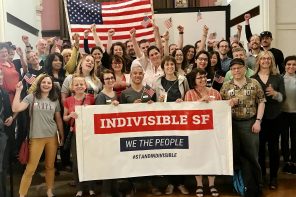“God is watching,” declared a full-page ad in the print edition of Politico this week, courtesy of Sojourners. (Was God watching when they refused to run the Believe Out Loud ad?) God is watching, Sojourners wants Congress and the White House to know, their slashing of programs for the poor.
About a dozen religious leaders were arrested after praying “to protect funding for the nation’s most vulnerable” in the Capitol Rotunda today.
Nobody is watching.
Nobody is listening.
Why? While a minister being led away in handcuffs might make for good press, it’s a completely ineffectual as a political strategy.
Harold Meyerson writes today of the Democrats “losing the big game” and how they “are getting clobbered” in the war of ideas:
[T]he continual stream of crap coming from both Republicans and, of late, Obama on the theme that cutting government spending will actually create jobs seems to be taking hold. As my Washington Post colleague and buddy E. J. Dionne noted yesterday, when Pew asked respondents in March how major spending cuts would affect the job situation, just 18 percent said they would help while 34 percent said they would hurt. In the poll released Tuesday, those numbers had substantially changed. Today, 26 percent said the cuts would help while just 27 percent said they would hurt. We’ve gone from a 2-to-1 plurality acknowledging that cuts would hurt to an even split on the question. These numbers, and the widening confusion they reflect, will come back to haunt the Democrats if and when they next propose a jobs program to help the economy get moving again.
The reason why Democrats are losing, as Meyerson and others have pointed out, is that they have relented to using the Republican Manual of Economic Destruction, which holds, essentially, that the national budget is just like your family’s household budget and balancing it must become a national fetish, regardless of what the economists say; and budget cuts, not tax revenues, are essential for balancing the budget and thus jump-starting the economy. Luckily the Democrats haven’t yet adopted the Alfred E. Newman approach to the consequences of a default.
Praying now that Congress won’t cut programs for the poor is so far behind the curve that it’s like asking that the genie be put back in the bottle — the deficit hawk genie, which the Democrats have stupidly let out.
Meanwhile, the religious right plays the long game, with an overriding ideology so clearly laid out in Paul Harvey’s essential piece on the Christian financial advisor Dave Ramsey. On economics, the right has successfully merged its various wings. The free market zealots are happy to have the religious right believe that the government should stay out of God’s and your (financial) business, and so are the mega-corporations and banksters profiting off the backs of not just the poor, but the middle class as well. Meanwhile, God will sort things out after the economy collapses. That is, if He’s watching.
At the heart of all this, as Joanna Brooks pointed out this morning, is an anti-state, that is, anti-government ideology. And it is the role of government — not just the impact on the poor and vulnerable — that the religious left has been hapless in either making a case for or defending. It’s not heart-rending, and it’s not God-y either. But these religious activists so ardently and sincerely praying for the poor have failed to make the case for why we need government, not just to have a “circle of protection” around poor people by ensuring that the government programs that aid them don’t get cut, but by ensuring that all citizens are not continually screwed by the financial services sector and other rapacious corporations run amok without any government oversight.
Some religious leaders, at least, are scandalized that the government sees fit to let taxpayer dollars fund religious discrimination by religious organizations who justify discrimination in the name of helping the poor; that at least provides an acknowledgement of the government’s proper role in public life. But that’s of little notice, apparently, to some of the early champions of President Obama’s Office of Faith-Based and Neighborhood Partnerships like Sojourners’ Jim Wallis who, in an example of the non-defense of the role of government, has said that faith-based community groups are better positioned to provide services to the poor than the government is.
While the administration was busy capitulating to the Republicans in slashing the budget, the director of Obama’s OFBNP, Joshua DuBois, was out on his “Connecting Communities for the Common Good” tour, peddling the idea that government and faith-based groups need to work together to help the needy. Because, of course, God is watching, and He’d probably be pretty pleased to see Democrats, once again, celebrating a Republican idea: that the Establishment Clause is a petty inconvenience, especially when you’re positioning yourself as the one swooping in to rescue the needy . . . from the recklessness of your political party. Speaking in Colorado, DuBois said, according to the Denver Post, “If your focus is first and foremost serving people in need, then there’s not a tremendous amount of time left to debate the finer points of the church-state relationship.” Ah, yes, the finer points of the Constitution. Who has time for that?




